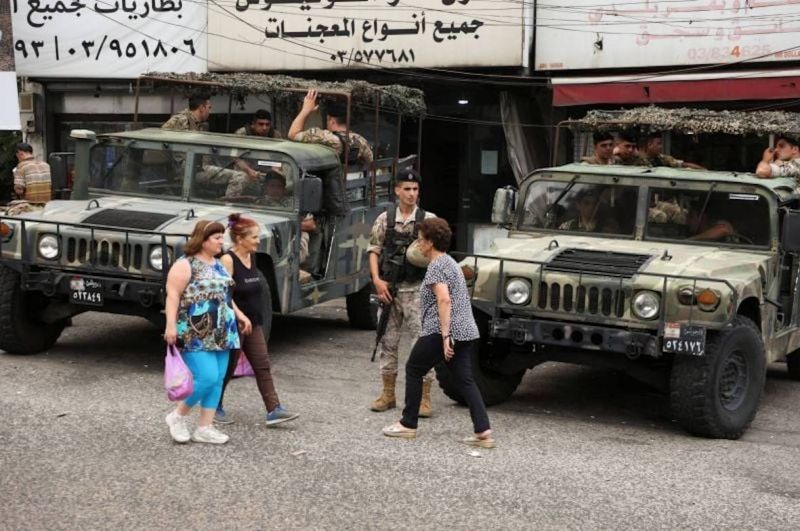
The Lebanese army deployed in Kahaleh Thursday, Aug, 10, the day after deadly clashes between local residents and Hezbollah elements. (Credit: REUTERS/Mohamed Azakir)
A Hezbollah-owned truck transporting ammunition overturned in the town of Kahaleh(Aley) Wednesday. An exchange of firearms ensued, resulting in the tragic deaths of two individuals.
Not a week has passed since July 1 without reports of security incidents, igniting fears of escalating turmoil amid a months-long presidential vacuum.
In July, two Christian residents of Bshari, Haitham and Malek Tawk, were fatally shot in the Qornet al-Sawda area (North Lebanon). The incident followed an exchange of gunfire with residents from the predominantly-Sunni locality of Bqaa Safrin.
Less than two weeks before the Kahaleh incident, Ain al-Hilweh refugee camp witnessed violent exchanges between gunmen affiliated with different Palestinian factions. After calm had largely returned to the camp, several Arab embassies in Beirut issued travel advisories, some telling their citizens to leave Lebanon quickly for their own safety.
The past few weeks have also witnessed a few random murders and kidnappings in Lebanon.
The latest episode was the killing of Elias Hasrouni, a former member of the Lebanese Forces (LF), who was found murdered in the town of Ain Ebel (Bint Jbeil), a week after being abducted on the night Aug. 2-3.
Is there anything connecting all these incidents, or is their timing mere coincidence? These questions arise because, in a country like Lebanon, politics and conspiracy theories are inextricable.
Some observers suggest that, one way or another, Hezbollah has been involved in all these incidents.
These events have also unfolded against a tense regional backdrop, marked by renewed tensions between Iran and Saudi Arabia, a few months after the Beijing agreement in March.
Is Lebanon once again at the heart of the conflict between the two regional heavyweights?
Panning back, one wonders who has an interest in playing the security card at the height of Lebanon’s summer season. Could this be a tactic to accelerate the political process, starting with the election of a new head of state, pending since June?
These questions elude easy answers and divide pundits.
One common denominator is emerging: Hezbollah is taking advantage of its political and military power to extend its hegemony over the country and impose its will on other stakeholders.
‘A blow to Christians’
Analyst Makram Rabah says the security incidents are not connected.
“What we’ve been experiencing for several weeks is far from being part of an external desire to shake the country and lead it into security chaos,” Rabah told L’Orient-Le Jour.
“They are simply the consequences of the fact that Hezbollah continues to control the country and impose its will, without any serious confrontation on the part of its adversaries.”
The anti-Hezbollah political camp is already in the midst of a political battle against the party over the election of a new president.
“LF leader, Samir Geagea, has learned the lessons from the October 2021 Tayouneh armed clashes [allegedly between LF supporters and armed individuals from Hezbollah and Amal],” Rabah said. “He doesn’t want to find himself in a position of [on the ground] confrontation. What happened in Kahaleh on Wednesday can be seen as a blow to Christians.”
LF spokesperson Charles Jabbour has a different reading.
“It’s not true that Christians are not in a good position in this confrontation,” he told L’Orient-Le Jour. “In addition to the political battle currently underway, people are now voicing their anger at Hezbollah’s actions, as was the case with Kahaleh residents.”
Jabbour concurred with Rabah’s opinion that the incidents are unconnected. This stance tacitly rejects the notion that the LF’s response to Wednesday’s shootings was a form of retaliation for Hasrouni’s death within a Hezbollah stronghold.
Lebanon, the Middle East’s postbox
Jabbour said it is unlikely that the situation would escalate to a scenario reminiscent of May 7, 2008, when Hezbollah operatives took over several neighborhoods in Beirut and the Chouf area.
These armed clashes paved the way for the Doha agreement, which, after a six-month presidential vacuum, allowed the election of then-army commander Michel Sleiman as president.
Could the Kahaleh incident lead to a similar scenario?
“There’s no president in the near future,” Rabah said, pointing out that the regional context is not conducive to this.
Mohanad Hajj Ali, researcher at the Carnegie Middle-East Center, seemed to concur.
“Everything that’s happening now is a reflection of the renewed tensions at the regional level,” Hajj Ali said. “Starting with the clashes in Ain al-Hilweh, which are part of a regional settling of scores, at a time when the political transition in Yemen is not on the right track, and when the Beijing agreement between Riyadh and Tehran has failed to establish the expected détente.”
He added, “Lebanon has thus once again become a postbox through which the regional powers convey their messages.”
These security incidents, Ali Hajj suggested, compounded by the economic and financial collapse and by the presidential vacuum, make the local scene even more volatile.
“Such incidents could increase in the future,” he added.
For military expert Riad Kahwagi things are clear. “Hezbollah has completed its hegemony over all the state’s workings,” he said, “and nothing happens in Lebanon without its green light.”
This story was originally published in French in L’Orient-Le Jour. Translation by Sahar Ghoussoub